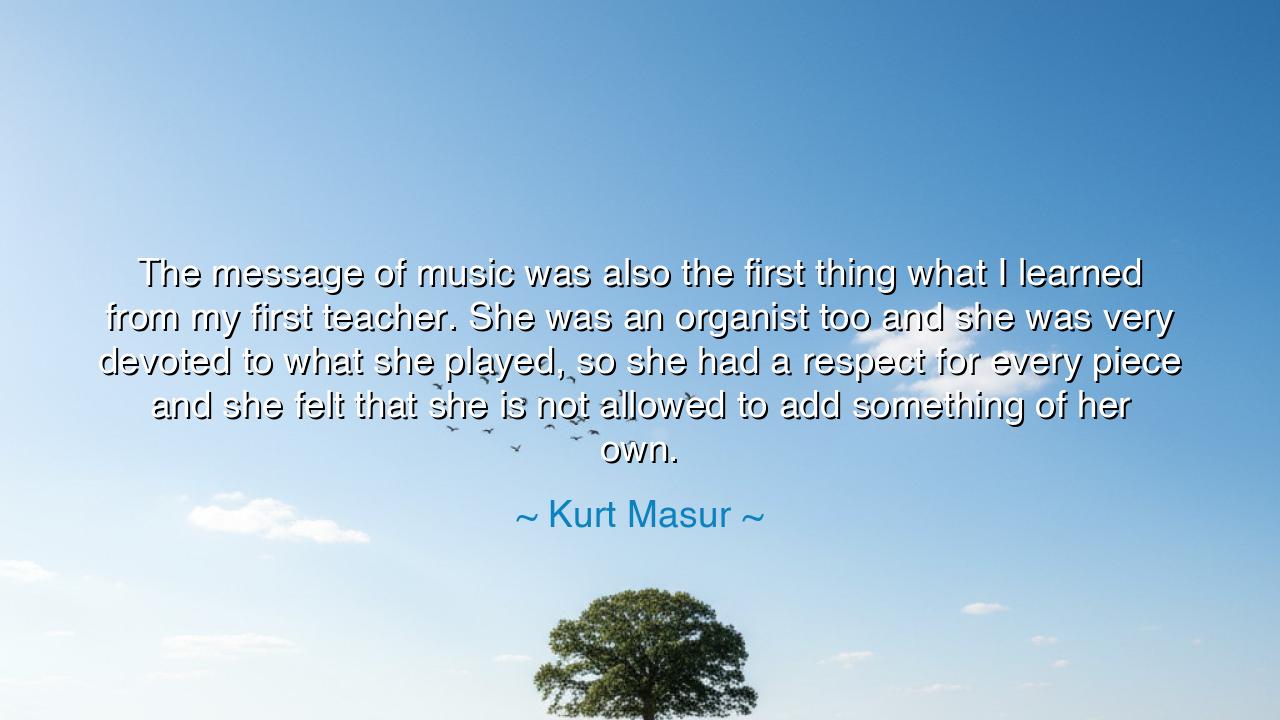
The message of music was also the first thing what I learned
The message of music was also the first thing what I learned from my first teacher. She was an organist too and she was very devoted to what she played, so she had a respect for every piece and she felt that she is not allowed to add something of her own.






Hear the words of Kurt Masur, master conductor and guardian of the symphonic tradition, who recalled the lesson of his youth: “The message of music was also the first thing what I learned from my first teacher. She was an organist too and she was very devoted to what she played, so she had a respect for every piece and she felt that she is not allowed to add something of her own.” In this testimony, Masur reveals the sacred essence of art: that music is not mere sound to be bent by whim, but a message entrusted to the performer, to be honored with devotion and humility.
For the teacher, an organist, embodied reverence. She approached each composition not as a canvas for her own vanity, but as a vessel for the composer’s soul. The organ, that great voice of the church, demands such humility. Each piece is like scripture—its meaning is not to be twisted for self-display, but revealed with purity. Thus the young Masur learned that to play music rightly is not first to shine, but to serve. To serve the piece, the composer, the truth that breathes within the notes.
This principle reaches far back into the traditions of art. In the Middle Ages, the builders of cathedrals carved their stones in anonymity, never seeking to stamp their names upon the soaring arches of Notre-Dame or Chartres. They believed the work itself was the message, and their duty was to realize it faithfully. So too with Bach, whose scores often bore the initials Soli Deo Gloria—“to the glory of God alone.” The artist, the teacher, the organist: each knew that art is larger than the individual. It is a trust, a flame passed down, to be tended with care.
Yet in Masur’s quote lies also a subtle tension. His teacher refused to “add something of her own,” for she feared that would dishonor the music. But in time, Masur himself, as conductor, learned the balance: one must respect the message, yet bring one’s own soul into harmony with it. The task is not to erase oneself, but to empty oneself of pride, so that the piece may flow through you. It is like prayer: the words are ancient, yet each voice must utter them anew. The respect must come first; only then can interpretation take its rightful place.
History shows us the fruit of this reverence. Arturo Toscanini, the legendary conductor, was famed for his fierce insistence on fidelity to the score. He believed the conductor’s duty was not to display ego but to let Beethoven, Verdi, or Wagner speak as purely as possible. And yet, precisely in that devotion, his interpretations shone with power. By bowing to the composer, he revealed his own greatness. Masur, guided by his first teacher, would follow a similar path: fidelity first, personality second.
The lesson for us is clear. Whatever our craft—music, words, deeds—we are not always called to invent from nothing, but often to carry forward what has been given. To treat inherited wisdom, traditions, or tasks as if they were our own playthings is arrogance. But to approach them with respect, devotion, and humility transforms us. For in serving, we are lifted higher than if we sought only to shine. Masur’s teacher, nameless to history, gave him this foundation—and through him, her lesson reached the world.
Therefore, O seekers, remember: the message of music, or of any art, is greater than the self. When you create, or when you perform, ask first not how you may display yourself, but how you may honor the truth entrusted to you. Do your work with fidelity, reverence, and discipline. And in that service, your own voice will emerge—not as a distortion, but as a vessel of something higher. For in respecting the work, you become part of its eternal message, and in humility, you find true greatness.






AAdministratorAdministrator
Welcome, honored guests. Please leave a comment, we will respond soon